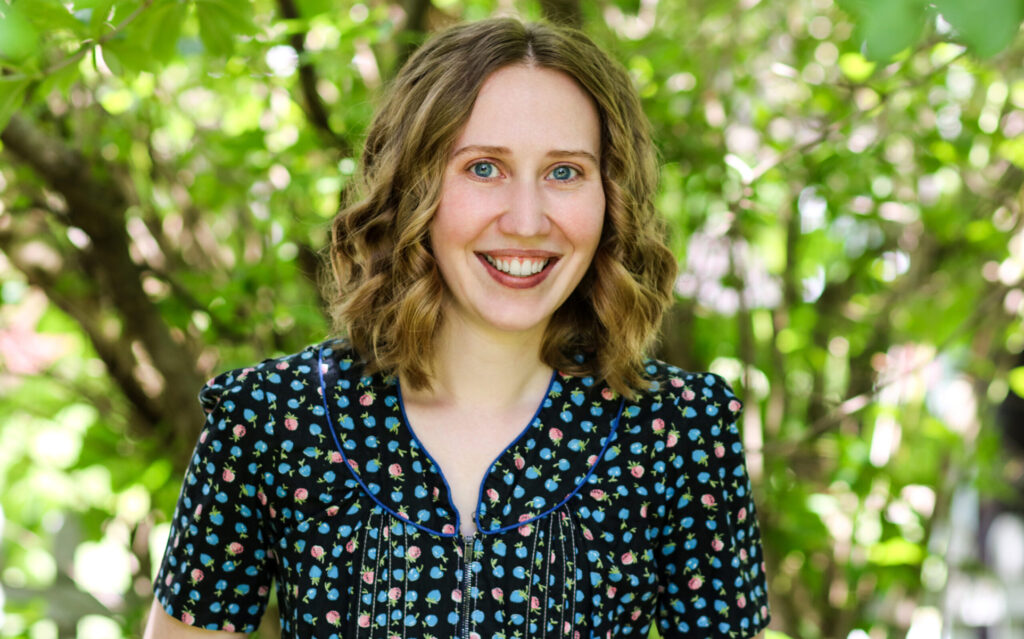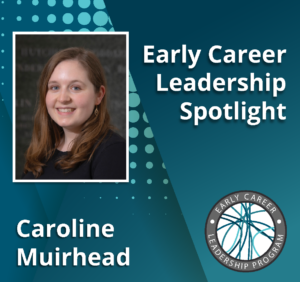We’re taking time to get to know the members of the GSA’s Early Career Scientist Committees. Join us to learn more about our early career scientist advocates.

Anna Moyer
Accessibility Subcommittee
University of Alabama at Birmingham
Research Interest:
I don’t remember very much about the birth of my little brother. I remember the way the light flickered onto the diamonds of the carpet as I wished for a new sibling, while spinning in wild circles and holding my older brother’s hands before toppling to the ground. I remember the excitement leading up to his birth, when I knew that I was going to be an older sister. And I remember my disappointment reflected in the picture window, nose to glass, expecting my parents’ arrival from the hospital.
I remember my mother’s tears, and I remember seeing my baby brother and thinking that he was perfect, although a little more wrinkly than I thought he would be. Then the mantra, “Sam has Down syndrome, which means that he has an extra chromosome. He just takes longer to learn things.” After all, how do you explain trisomy 21 to a three-year-old?
As we grew, I learned more about the challenges my brother would face as a person with Down syndrome. Although the median age at death for people with trisomy 21 has increased from just 1 year in 1968 to 49 years in 1997, there are still no FDA-approved treatments for Down syndrome-associated intellectual disability. And as the lifespan of people with Down syndrome continues to increase, more adults with Down syndrome will face the devastating consequences of Alzheimer’s neuropathology and dementia. Despite its status as the most common genetic cause of intellectual disability, affecting 1 in 700 births worldwide, Down syndrome has received relatively little attention from the genetics research community.
Inspired by my brother’s experiences, I completed my PhD in the lab of Dr. Roger Reeves at the Johns Hopkins School of Medicine. My doctoral research focused on abnormal sonic hedgehog signaling in neuronal precursors isolated from a Down syndrome mouse model. To understand which trisomic genes contribute to abnormal brain development, I overexpressed a library of 163 human chromosome 21 genes in a series of sonic hedgehog-responsive cell lines. Whereas previous studies have attempted to link a single trisomic gene to a single Down syndrome-associated phenotype, we found that many chromosome 21 genes may contribute to the dysregulation of a central signaling pathway. These results are significant because they reframe Down syndrome as a complex genetic disorder and suggest that targeting a shared molecular pathway for therapeutic intervention may be more effective than targeting a single chromosome 21 gene.
For my postdoctoral research, I plan to follow up on hits from my overexpression screen using the larval zebrafish model system. Dr. Summer Thyme pioneered a method for high-throughput brain activity and morphology screening of genes linked to neurodevelopmental disorders. We will apply this screening approach to Down syndrome by generating transgenic zebrafish that overexpress the fish orthologs of human chromosome 21 genes. Establishing zebrafish as a Down syndrome model will pave the way for high-throughput drug screens, which are technically challenging in existing animal models of Down syndrome.
As a PhD-trained scientist, you have many career options. What interests you the most?
Witnessing the divide between researchers and patient advocates early in my graduate career crystallized my goal to bridge the gap between people with Down syndrome and the scientists who study them. My ultimate goal is to direct a Down syndrome research lab that spans basic and preclinical research. In particular, I want to center the experiences of people with Down syndrome and their families and use their insights to inform basic research. Although collaboration between patients and scientists has become more common, working effectively with a population that has historically suffered from a lack of self-advocacy and self-determination remains challenging. People with Down syndrome and their families represent an untapped resource for cataloging Down syndrome phenotypes and understanding which outcome measures are most important to the individuals that treatments aim to benefit.
I occupy a unique position as a scientist and sibling of a person with Down syndrome. As a scientist, I am drawn to Down syndrome research for its enormous complexity and seeming intractability. My intellectual curiosity drives my desire to understand Down syndrome at the cellular and molecular levels. At the same time, I understand the pressing need to advance discovery in Down syndrome research, given the lack of effective treatments for many Down syndrome-associated phenotypes, including intellectual disability, acute regression, Alzheimer’s neuropathology, and dementia. I hope that my desire to engage with Down syndrome populations also marks a generational shift in how scientists interact with society and communicate new research findings.
In addition to your research, how do you want to advance the scientific enterprise?
Although I identify as a scientist with a disability, I chose to hide the effects of my connective tissue disorder from my colleagues until the unexpected death of a classmate highlighted the importance of advocating for other students with disabilities, chronic illnesses, and mental health conditions. After disclosing my condition more publicly, I founded a committee at the Johns Hopkins School of Medicine to support other students with these conditions. I conceived and implemented an ongoing lecture series featuring disabled scientists and clinicians, including Dr. Kay Jamison, Dr. Chad Ruffin, and Dr. Bonnielin Swenor. I also organized events to connect students with disabilities across the university, such as film screenings, book clubs, and happy hours.
Networking with other students lessened my own sense of isolation and brought to light the rampant academic ableism that systematically excludes disabled scientists from top research institutions. Limited access to affordable healthcare options disproportionately affects trainees with chronic illnesses; students accumulate thousands of dollars of medical debt while in graduate school. Disabled students may face discrimination based on preconceived perceptions of ability; students are forced to switch labs after disclosing mental health conditions to their thesis advisors. The culture of overwork that celebrates long days in the lab may aggravate chronic health conditions; students feel pressured to choose between their health and their scientific productivity.
While some aspects of accessibility are relatively straightforward to implement, such as providing ASL interpretation or large-print materials, improving the culture and climate surrounding disability will require sustained and intentional advocacy. As a scientist-in-training, I hope to advance the scientific enterprise by making academia a safer place for disabled students, who deserve the same support afforded to other underrepresented groups in science and medicine.
As a leader within the Genetics Society of America, what do you hope to accomplish?
Disability is a facet of diversity, and disabled scientists possess invaluable insights into living with the conditions that scientific research aims to treat. As a member of the Early Career Leadership Program, I hope to contribute to the genetics community by advocating for policies that provide equal access to trainees with disabilities. Although individuals with disabilities are underrepresented in biomedical research, trainees with disabilities may not disclose their conditions due to fears of discrimination or mistreatment. This lack of disclosure may hamper community-building between disabled trainees, leaving them feeling isolated and without disabled mentors. Improving the climate surrounding disability in academia is a necessary first step toward allowing disabled trainees to feel safe enough to disclose their conditions.
As a member of the Accessibility Subcommittee, I hope to work towards replacing the question of “How can we make the genetics community more accessible to disabled trainees?” with “What do disabled trainees offer the genetics community?” While the first question focuses on fulfilling minimum legal requirements for accommodations, the second highlights the value of including the perspectives of scientists of all identities, including those with disabilities. Specifically, the Genetics Society of America can support disabled scientists through the following initiatives:
- Improving the accessibility of conferences and other events. COVID-19 has offered both challenges and benefits to scientists with disabilities, and I am interested in understanding how lessons learned from the pandemic can be used to maximize accessibility in the future. As life returns to pre-pandemic “normal,” we must guarantee that disabled scientists who remain at high risk from COVID-19 have access to hybrid/virtual conference options.
- Building community for trainees with disabilities, chronic illnesses, and mental health conditions. Community-building may allow disabled scientists to feel less isolated and share practical ideas for navigating the disability experience in the lab.
- Including disability in existing diversity initiatives. Despite data showing that scientists with disabilities are underrepresented in biomedical research, existing diversity initiatives do not always mention disability along with other aspects of identity.
- Promoting the visibility of successful scientists with disabilities. Highlighting the successes of senior scientists may show students and postdocs that it is possible to have a productive career while navigating the challenges of disability in academic science.
- Challenging the medical model of disability that is implicit in much of genetics research. Most translational research proceeds under the assumption that genetic diseases should be treated, but some disabled individuals may actually take pride in their conditions. Drawing attention to the diverse perspectives of disabled people on treatments for genetic conditions will help to center the patient experience in genetics research.
Previous leadership experience
- Co-founder of Equal Access in Science and Medicine committee, which advocates for disabled trainees in the Johns Hopkins School of Medicine
- Creator of Accessible Chef, a website of visual recipes to teach basic cooking skills to individuals with intellectual disabilities
- 2021 inductee of the Edward A. Bouchet Graduate Honor Society
- Recipient of the Johns Hopkins Diversity Leadership Award, Johns Hopkins National Disability Employment Awareness Month Award, and Johns Hopkins Accessibility & Inclusion Student Group Award
You can contact Anna Moyer by email at anna.moyer@gmail.com, on Twitter @annajoycemoyer, or on LinkedIn @annajmoyer.














